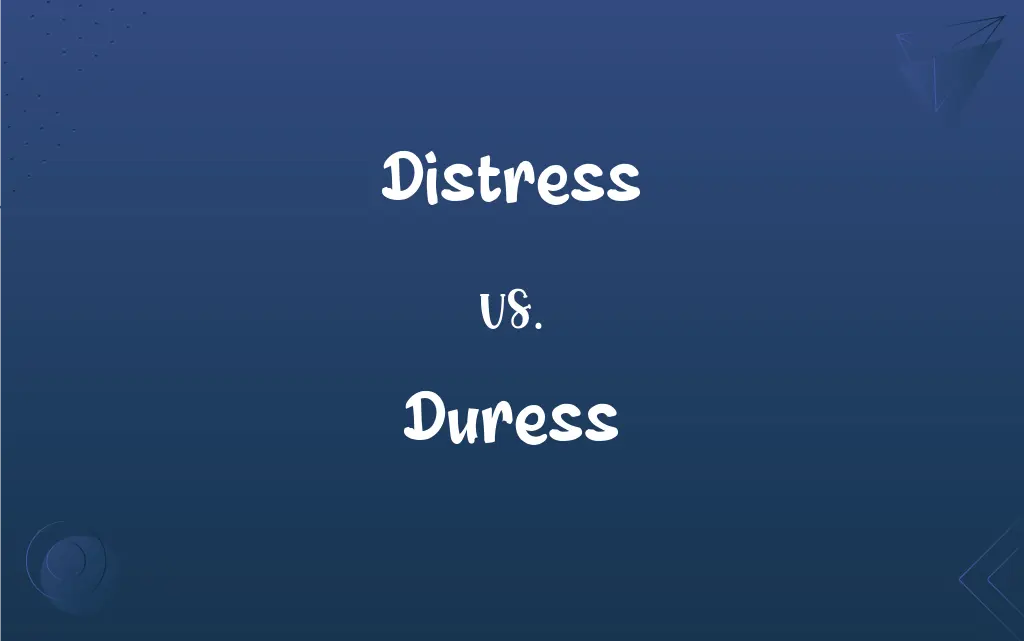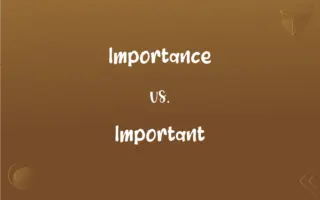Distress vs. Duress: What's the Difference?
Edited by Harlon Moss || By Janet White || Updated on October 11, 2023
"Distress" is suffering or pain, mental or physical; "Duress" is coercion or force against someone's will.

Key Differences
"Distress" refers to a state of pain, suffering, or discomfort, either physical or emotional. This term can encompass a broad range of experiences, from financial hardship to emotional anguish. "Duress", on the other hand, specifically denotes compulsion or force exerted upon someone to make them act against their will.
In the realm of psychology and health, "Distress" signifies negative stress or strains that an individual finds overwhelming or too challenging. Conversely, "Duress" in the legal domain means unlawful pressure or threats used to compel someone into a contract or committing a crime.
It's essential to understand that while both words deal with uncomfortable situations, their causes differ. "Distress" often arises from internal factors or external challenges like personal tragedies or health issues. In contrast, "Duress" is a direct result of external pressure, often from another person or entity.
From a linguistic standpoint, "Distress" can be both a noun and a verb. For instance, one might be 'in distress' or 'distress someone' with bad news. "Duress", however, remains primarily a noun in usage, describing the state or act of coercion.
Comparison Chart
Primary Definition
Pain, suffering, or discomfort.
Coercion or force against someone's will.
ADVERTISEMENT
Field of Use
Psychology, health, general.
Legal.
Cause
Internal or external challenges.
External force or pressure from others.
Grammatical Usage
Can be both noun and verb.
Primarily used as a noun.
Associated Emotion
Anxiety, sorrow, pain.
Fear due to coercion.
Distress and Duress Definitions
Distress
Extreme anxiety, pain, or sorrow.
The news of the accident caused her great distress.
ADVERTISEMENT
Duress
Compulsion or force exerted to make someone act.
He signed the contract under duress.
Distress
A situation necessitating immediate assistance.
The ship sent out a distress signal.
Duress
Coercion influencing someone's behavior.
His actions, though regrettable, were committed under duress.
Distress
A state of adversity or difficulty.
Economic distress affected the entire nation.
Duress
Unlawful pressure leading to actions against one's will.
The confession was obtained through duress.
Distress
Physical or mental strain.
Prolonged work hours led to his distress.
Duress
Threats or violence forcing compliance.
She acted under duress and feared for her family.
Distress
To cause strain, anxiety, or suffering to.
Duress
Compulsion by threat or violence; coercion
Confessed under duress.
Distress
To mar or otherwise treat (an object or fabric, for example) to give the appearance of an antique or of heavy prior use.
Duress
Constraint or difficulty caused by misfortune
"children who needed only temporary care because their parents were ill, out of work, or under some other form of duress" (Stephan O'Connor).
Distress
(Archaic) To constrain or overcome by harassment.
Duress
A fraud achieved through the use of a threat or compulsion
She had a cause of action for duress. His claim was based on duress.
Distress
Anxiety or mental suffering.
Duress
A criminal defense for an act undertaken under threat of serious bodily harm
His defense was duress.
Distress
Bodily dysfunction or discomfort caused by disease or injury
Respiratory distress.
Duress
Forcible confinement.
Distress
Physical deterioration, as of a highway, caused by hard use over time
Pavement distress.
Duress
(obsolete) Harsh treatment.
Distress
The condition of being in need of immediate assistance
A motorist in distress.
Duress
Constraint by threat.
Distress
Suffering caused by poverty
Programs to relieve public distress.
Duress
(legal) Restraint in which a person is influenced, whether by lawful or unlawful forceful compulsion of their liberty by monition or implementation of physical enforcement; legally for the incurring of civil liability, of a citizen's arrest, or of subrogation, or illegally for the committing of an offense, of forcing a contract, or of using threats.
Distress
(Law) The act of distraining or seizing goods to compel payment or other satisfaction for a debt or other duty owed; distraint.
Duress
To put under duress; to pressure.
Someone was duressing her.
The small nation was duressed into giving up territory.
Distress
Physical or emotional discomfort, suffering, or alarm, particularly of a more acute nature.
Duress
Hardship; constraint; pressure; imprisonment; restraint of liberty.
The agreements . . . made with the landlords during the time of slavery, are only the effect of duress and force.
Distress
A cause of such discomfort.
Duress
The state of compulsion or necessity in which a person is influenced, whether by the unlawful restrain of his liberty or by actual or threatened physical violence, to incur a civil liability or to commit an offense.
Distress
Serious danger.
Duress
To subject to duress.
Distress
(medicine) An aversive state of stress to which a person cannot fully adapt.
Duress
Compulsory force or threat;
Confessed under duress
Distress
(legal) A seizing of property without legal process to force payment of a debt.
Duress
A method to achieve agreement by intimidation.
The hostages were held under duress.
Distress
(legal) The thing taken by distraining; that which is seized to procure satisfaction.
Distress
To cause strain or anxiety to someone.
Distress
(legal) To retain someone’s property against the payment of a debt; to distrain.
Distress
To treat a new object to give it an appearance of age.
A pair of distressed jeans
She distressed the new media cabinet so that it fit with the other furniture in the room.
Distress
Extreme pain or suffering; anguish of body or mind; as, to suffer distress from the gout, or from the loss of friends.
Not fearing death nor shrinking for distress.
Distress
That which occasions suffering; painful situation; misfortune; affliction; misery.
Affliction's sons are brothers in distress.
Distress
A state of danger or necessity; as, a ship in distress, from leaking, loss of spars, want of provisions or water, etc.
Distress
The act of distraining; the taking of a personal chattel out of the possession of a wrongdoer, by way of pledge for redress of an injury, or for the performance of a duty, as for nonpayment of rent or taxes, or for injury done by cattle, etc.
If he were not paid, he would straight go and take a distress of goods and cattle.
The distress thus taken must be proportioned to the thing distrained for.
Distress
To cause pain or anguish to; to pain; to oppress with calamity; to afflict; to harass; to make miserable.
We are troubled on every side, yet not distressed.
Distress
To compel by pain or suffering.
Men who can neither be distressed nor won into a sacrifice of duty.
Distress
To seize for debt; to distrain.
Distress
Psychological suffering;
The death of his wife caused him great distress
Distress
A state of adversity (danger or affliction or need);
A ship in distress
She was the classic maiden in distress
Distress
Extreme physical pain;
The patient appeared to be in distress
Distress
The seizure and holding of property as security for payment of a debt or satisfaction of a claim;
Originally distress was a landloard's remedy against a tenant for unpaid rents or property damage but now the landlord is given a landlord's lien
Distress
Cause mental pain to;
The news of her child's illness distressed the mother
Distress
To cause anxiety or pain.
He was distressed by the loss of his job.
FAQs
Can "Distress" also be a verb?
Yes, "Distress" can be used as a verb, meaning to cause anxiety or pain.
Is "Duress" used outside legal contexts?
While primarily legal, "Duress" can be used in general contexts to denote strong coercion.
Can financial challenges be considered "Distress"?
Yes, financial hardships can lead to economic distress.
Does "Distress" only refer to emotional pain?
No, "Distress" can refer to both emotional and physical pain.
If someone is pressured but agrees willingly, is it "Duress"?
If the pressure is coercive and against one's initial will, it's "Duress".
Does "Duress" always involve threats of violence?
No, "Duress" can involve any form of pressure or coercion, not just violent threats.
Can one party claim a contract is void due to "Duress"?
Yes, if a contract was signed under "Duress", it can be considered void in many legal systems.
Does "Duress" only relate to physical threats?
No, "Duress" can involve any form of coercion, including threats or intimidation.
Does "Duress" require physical presence?
No, "Duress" can be exerted through various means, including remotely through threats.
Is "Duress" always illegal?
Often in legal contexts, duress is unlawful, especially when it forces actions against one's will.
What might be a synonym for "Distress"?
A synonym could be "anguish" or "suffering".
How might someone exhibit signs of "Distress"?
Signs can range from physical symptoms, anxiety, to overt expressions of pain or sorrow.
Can "Distress" lead to health issues?
Chronic distress can lead to various health concerns, including mental health disorders.
What might be an opposite of "Distress"?
"Eustress", a positive form of stress, could be considered opposite in some contexts.
Can psychological tactics create a state of "Duress"?
Yes, psychological manipulation or threats can lead to "Duress".
Are there legal consequences for exerting "Duress"?
Yes, using "Duress" unlawfully can lead to legal penalties.
Can "Duress" be subtle?
Yes, "Duress" can be overt or subtle, as long as it influences someone against their will.
Can "Distress" arise from positive events?
Yes, events like marriage or a new job, while positive, can lead to "Distress" due to sudden change.
How does "Distress" differ from regular stress?
While stress can be positive or negative, "Distress" is negative stress that's often overwhelming.
Does "Distress" always need intervention?
Not always, but severe or prolonged distress often benefits from professional intervention.
About Author
Written by
Janet WhiteJanet White has been an esteemed writer and blogger for Difference Wiki. Holding a Master's degree in Science and Medical Journalism from the prestigious Boston University, she has consistently demonstrated her expertise and passion for her field. When she's not immersed in her work, Janet relishes her time exercising, delving into a good book, and cherishing moments with friends and family.
Edited by
Harlon MossHarlon is a seasoned quality moderator and accomplished content writer for Difference Wiki. An alumnus of the prestigious University of California, he earned his degree in Computer Science. Leveraging his academic background, Harlon brings a meticulous and informed perspective to his work, ensuring content accuracy and excellence.































































